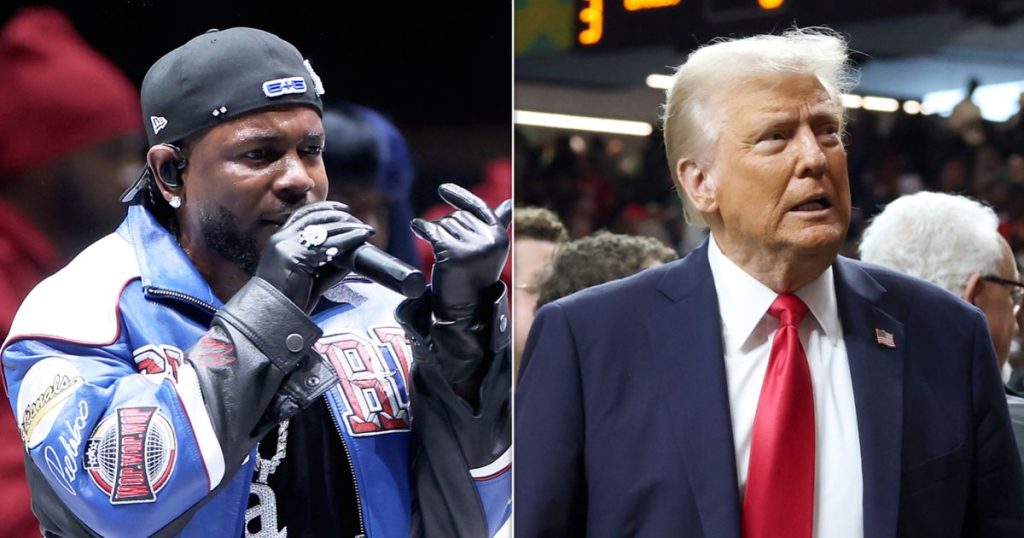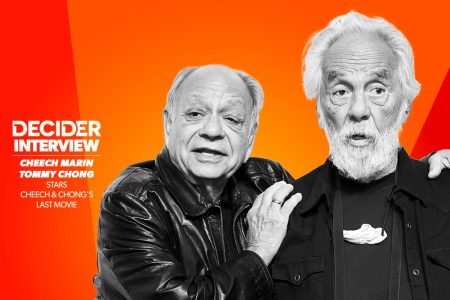Kendrick Lamar’s electrifying performance at Super Bowl LIX Halftime Show was a moment of triumph for the rapper, who had just swept the Grammys with five awards for his song “Not Like Us”. Fans tuned in eagerly, expecting a possible nod to his longstanding feud with Drake, given the track’s perceived aim at his rival. However, what caught the attention of many was not just his dynamic setlist or his big wins, but also what seemed like a subtle yet powerful dig at President Donald Trump, who was in attendance. Trump, making history as the first sitting U.S. president to attend a Super Bowl, witnessed Lamar’s masterful blend of music, art, and social commentary—a performance that resonated deeply with themes of identity, representation, and resistance.
Lamar’s show was a celebration of his musical prowess, featuring hits like “DNA,” “Humble,” and “Squabble Up”, with SZA and DJ Mustard joining him on stage. The performance was also layered with symbolic moments, thanks in part to an unexpected introduction by Samuel L. Jackson, who appeared as Uncle Sam. Dressed in a top hat and striped suit, Jackson personified America itself, interrupting Lamar between songs and making a striking comment: “You’re too ghetto.” This line, delivered by a figure representing the nation, sparked intense discussion on social media. Many interpreted it as a critique of how America often marginalizes and dismisses Black artistry, even as it benefits from it. The moment was made even more poignant by the presence of Trump, who has been vocal in his opposition to diversity, equity, and inclusion (DEI) initiatives—a stance that has drawn widespread criticism.
The NFL’s decision to remove the slogan “End Racism” from the field and replace it with “Choose Love” added another layer of controversy to the event. This move was seen by many as a step backward, especially given the broader context of Trump’s efforts to dismantle DEI programs across the country. The league defended its choice, citing recent tragedies such as wildfires in California, a terrorist attack in New Orleans, and multiple plane crashes, as reasons to focus on a message of unity and love. However, critics argued that erasing explicit anti-racism statements diminished the opportunity to address systemic issues head-on. For many viewers, Lamar’s performance became a powerful counterstatement, using his platform to reclaim and redefine what it means to be American.
Lamar’s set, which included a striking visual of his all-Black backup dancers arranged in the formation of the American flag, was seen as a bold rejection of Trump’s vision of America—one that seeks to erase diversity and limit inclusion. The juxtaposition of Jackson’s Uncle Sam character telling Lamar he’s “too ghetto,” followed by the image of Black dancers embodying the flag, was interpreted by many as a direct challenge to Trump’s ideology. It was a moment of artistic defiance, reminding viewers that America’s true strength lies in its diversity, not in the exclusionary rhetoric championed by the former president.
Trump’s reaction to Lamar’s performance remains unclear, as he has yet to publicly address it. However, CNN’s Brian Stelter reported that Trump left his suite before the show ended, a detail that sparked speculation about whether the president was uncomfortable with the overtly political undertones of the performance. This wouldn’t be the first time Lamar has criticized Trump. In songs like “The Heart Part 4” and “XXX.”, Lamar has explicitly condemned Trump’s policies and rhetoric, using his music as a vehicle for activism. His Super Bowl performance felt like an extension of that tradition—a continuation of his ongoing effort to challenge injustice and amplify marginalized voices.
In the end, Lamar’s halftime show was more than just a musical spectacle; it was a cultural statement. It reminded millions of viewers that art has the power to confront, critique, and inspire. By weaving together personal triumph, historical context, and timely commentary, Lamar delivered a performance that transcended the game itself. Love him or not, Kendrick Lamar once again proved why he is one of the most influential figures in music today—a master of his craft and a fearless voice for change.









